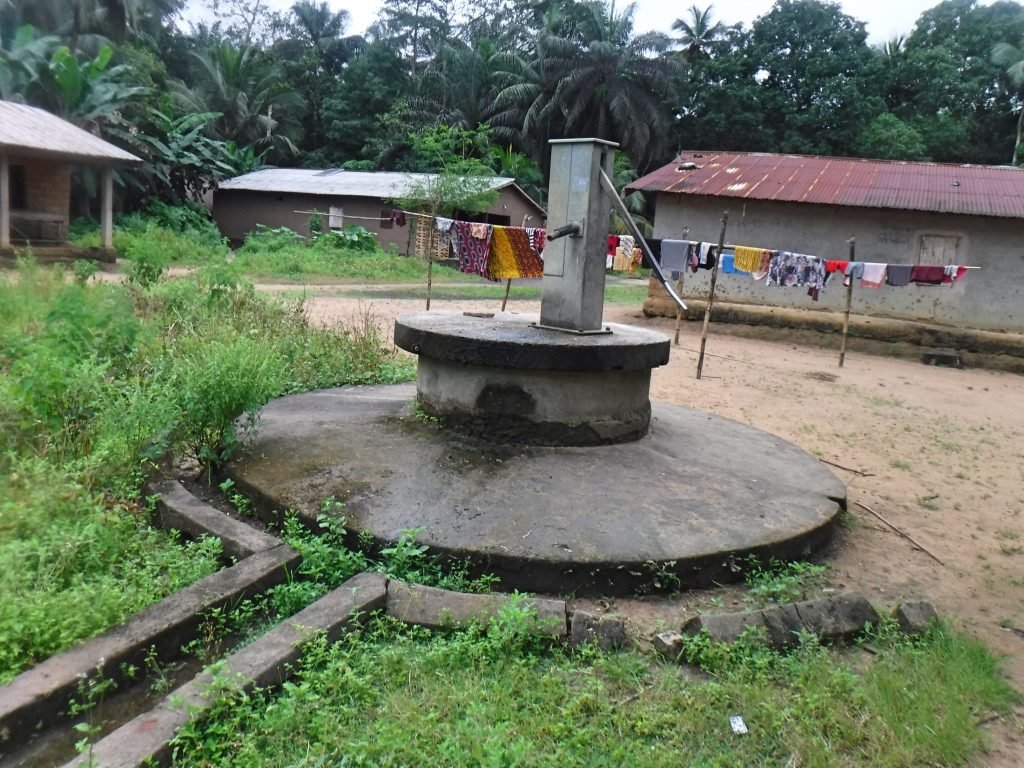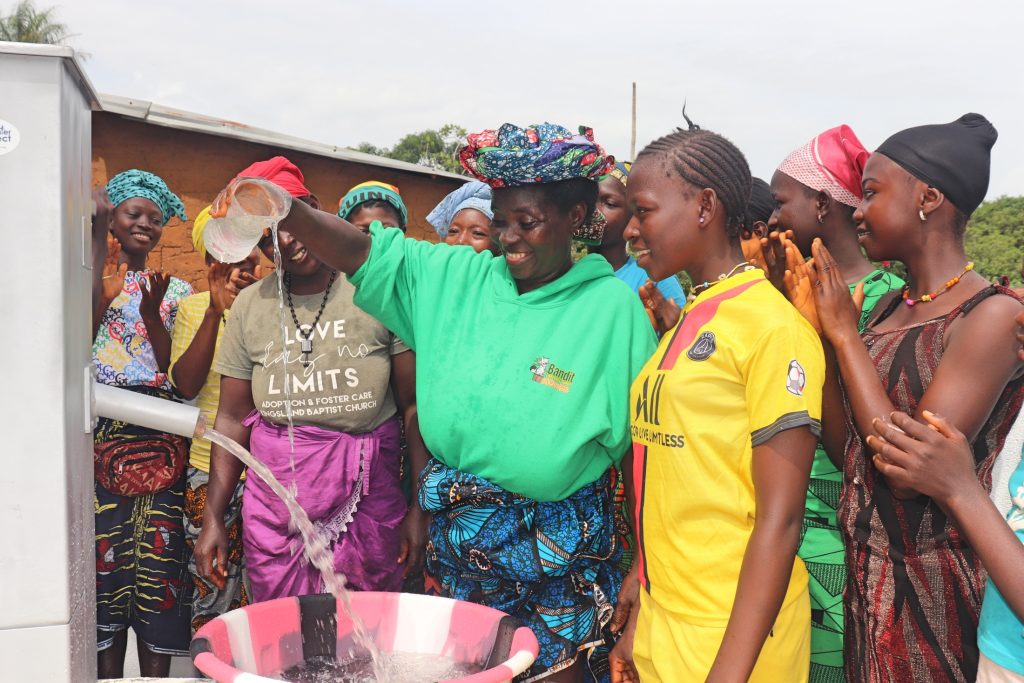How Seasons Affect Water Availability in Sierra Leone
Because Sierra Leone is so close to the equator, it doesn’t get four seasons like the United States does. Instead, there are wet months and dry months. And, unlike our other service areas, which each get two rainy seasons and two dry seasons per year, Sierra Leone suffers through long, continuous droughts and only one month of severe rain.

“The dry season starts in December and ends in April,” said Alie Kamara, Community Engagement Officer for our partner, Mariatu’s Hope, in Sierra Leone. “The rainy season starts in May and ends in November.”
This has been the cycle in Sierra Leone for a long time. But as the country’s population grows and more and more of its trees are cut down for commercial purposes, Sierra Leone’s water cycle is changing, and the environment is less able to provide and remove impurities from both surface and groundwater supplies.
With climate change lengthening the dry seasons and making rains (and floods) more unpredictable in recent years, the water situation for the residents of Sierra Leone is worsening day by day.
“[The] water crisis…is one critical issue impeding progress for the people,” said Alie. “People dug wells to curtail [the] water crisis in the country, but these wells are not sustainable; [they go] dry during the dry season. There are [many] causes of [the] water crisis, such as climate change, increase of human population, floods, overuse and wastage of water, [and] drought.”
Sierra Leone is among the 10 percent of countries in the world that are most vulnerable to the adverse consequences of climate change, and presently one of the least able to cope with the effects.
UN Africa
For The Water Project, this means a good deal of our work in Sierra Leone involves rehabilitating wells that have dried out. For the people who live in Sierra Leone, the effects of climate change translate to once-reliable water sources drying out and alternative water sources (most often surface water sources) becoming more polluted.
The Dry Season
“During the dry season, the availability and quality of water becomes a big problem in Sierra Leone,” Alie explained. “When the water sources go dry, the people can’t get enough water to drink, wash, and [do] hygiene practices. This causes people to be exposed to water-related illnesses.”
“A lot of shallow wells dry up during the dry season,” said Mohamed Turay, Deputy Country Director in Sierra Leone. “The water quality is also poor due to lack of adequate sources. Communities usually use what is available, even though it might pose a health risk.”
“Water challenges are disturbing as a nursing mother, especially in the dry season,” said Mameh Conteh from Makombor Community in Sierra Leone, where we’re hoping to rehabilitate the dried-out community well this year.

“I had challenges with water during the dry season between the period of March and April. I had to go to the alternate source, which is a long distance from my village. When there is a shortage of water in our community, we have no alternative but to go to the stream.
“The stream is open, and this will let animals access it. They drink and urinate in the water, and we are using the same water to drink. We normally get sick after drinking water from this source. There are also activities like laundry, bathing, and palm oil processing that are done at the alternate source. These activities contaminate the water and cause sickness.”
Not only does drinking the swamp water pose serious health risks, but traveling to the swamp is dangerous in itself.
“Sometimes, I come across dangerous animals like snakes and other dangerous animals,” Mameh said. “In September, when there is sufficient sun, snakes lie on the road to find heat. This makes us afraid to go to the alternate water source to fetch water because of snake bites and other attacks of dangerous animals.”
The Rainy Season
The rainy season brings its own set of challenges.
“During the rainy season, there is plenty of water, but it lacks purity, increasing the chances of children and adults drinking rainwater that is not filtered,” said Mohamed. “In most areas, due to deforestation, soil runoff negatively impacts the quality of the water, especially [in] coastal areas and congested communities.”
With more trees and roots in an area, it’s easier for water to be naturally filtered and for contaminants to be removed. But with the high amount of rain and less natural filtration, the water becomes poison. So even if there’s an excess of water, none of it will be drinkable.
“During the rainy season, the [water] constraints become more eminent,” said 26-year-old trader Yakonnie Kamara from Rogberay Community, where we rehabilitated the well last year. “At this time, the water itself is very scarce to drink because when [the] rain comes, all the dirt from the surrounding [area] will be discharged into the swamp, which [makes] the water very dirty and muddy.”
“During the rainy season when the water gets full and dirty, I fetch water with leeches, tadpoles, and even frogs [inside] to carry it at home,” added 15-year-old Fatmata, from the same community.
Our Solution
With hand-dug wells drying out during the dry season and overflowing with contaminants during the rainy season, the best way for us to provide water in Sierra Leone is by drilling borehole wells and converting hand-dug wells to boreholes.
“Due to climate change and deforestation, hand-dug wells are slowly becoming obsolete,” Mohamed said. “The most sustainable sources of water in Sierra Leone are boreholes and borehole conversions. Both borehole conversions and boreholes are more likely to produce clean and safe water all year round with very little to no contamination.”
Borehole wells surpass the contaminated surface water and reach groundwater that has been naturally filtered and protected from contamination. Although borehole wells cost a little more than hand-dug wells to install upfront, the peace of mind for the people we serve is more than worth the extra expense.
“I used to wake up very early in the morning to go to the swamp to fetch water,” said 41-year-old trader Kadiatu Kamara from Amaraya Community, where we just recently finished rehabilitating the community well.

“The distance from the community to the swamp is far, and I must go to the market to sell my goods. By the time I completed all my house chores, I would be late for going to the market. Now that this water point is complete in my community, I will now have enough time to go to the market earlier, and sell my crops, and return home to prepare food for my family. Also, my children will now go to school earlier and have enough time to study, as the water point is very close to our house.
“Honestly, this water point is a blessing to all of us in this community, especially in the area of preventing us from waterborne sicknesses. We are really thankful to the organization for this help. May the almighty God continue to bless you all.”
What’s happening in Sierra Leone to people like Mameh and Yakonnie demonstrates the far-reaching effects of climate change, especially on water availability. Each changing season brings its own set of challenges, leading to health risks, a loss of time and productivity, and a persistent struggle for clean water.
But the good news is that we are working to address the critical need for sustainable water solutions. Through the rehabilitation of hand-dug wells and drilling of new boreholes, there is hope for the people of Sierra Leone to access clean, safe water all year round. But these initiatives require support.
By donating to The Water Project, you can help provide clean water to those affected by drought and climate change. Your donation can improve health, increase educational opportunities, and foster economic growth in communities that need it the most.
Together, we can make a difference in the fight against water scarcity and climate change.
Home More Like ThisTweet